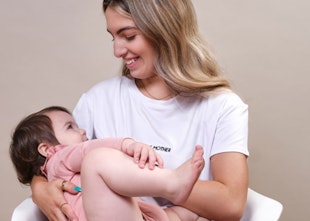Considered the first from of independent movement, learning to crawl is one of the most important milestones in your child's development.
On average, babies tend to crawl around at eight or nine months of age, however, some children need a little more time and encouragement while others tend to skip the crawling stage altogether.
Why learning to crawl important?
Over the years research has proven if a child skips this step it can lead to poor posture, feeding challenges and poor upper body strength amongst many other issues in later life. For this reason, it is essential that you encourage your baby to crawl as much as you can.
Other reasons include:
Physical development
Movement through crawling helps develop muscles in the head, neck, back, arms and muscles while also supporting the development of fine and gross motor skills.
Spatial awareness
Crawling provides babies with a physical understanding of objects around them which is essential in enhancing self-preservation and navigation as well as problem-solving skills.
Coordination
For a baby to achieve stable mobility the brain must process hearing, sight and movement at any one-time. These connections will naturally increase the more they practice their new skills.

Independence
Crawling provides babies with an opportunity to explore the world around them in a safe environment giving them a great sense of independence as they figure everything out.
Physical strength
With time, your baby's physical strength such as the back, arm and leg muscles will begin to develop and strengthen. Before you know it your baby will be walking on their own two feet.
How can I encourage my baby to crawl?
It's quite simple actually, simply get on the floor and support your babies crawling skills.
- Make time for tummy time. When your baby is fed and well-rested schedule plenty of floor time with your baby several times a day for five to ten minutes.
- Baby-proof your home. Your child's newfound mobility can lead to injury if there are dangerous obstacles in the way. See the world through your babies eyes and make it a safe place for them to discover and explore.
- Show them. Sounds silly, I know but show them and encourage them to do what you are doing. You can also place a mirror in front of them which has been proven effective over the years. Naturally, babies will want a closer look at their reflection and may crawl forward to do so.
- Use props. Place your baby’s favourite toy out of reach and encourage them to get it. Most likely the baby will reach out, rocking back and forth while scooting their body towards the chosen toy in an attempt to crawl.
- Don't give up. Some babies will only tolerate small pockets of time on the floor and that is completely okay. Reassure them if they get frustrated, never force them to keep trying and if they get upset or start crying lift them, comfort them and try again later or the next day.
And remember, some babies tend to take longer than others learning how to crawl. With time and plenty of encouragement, they will be flying across the room and you will be wishing they weren't so mobile. However, if you have any concerns about your baby's development at any time contact with your Public Health Nurse.







